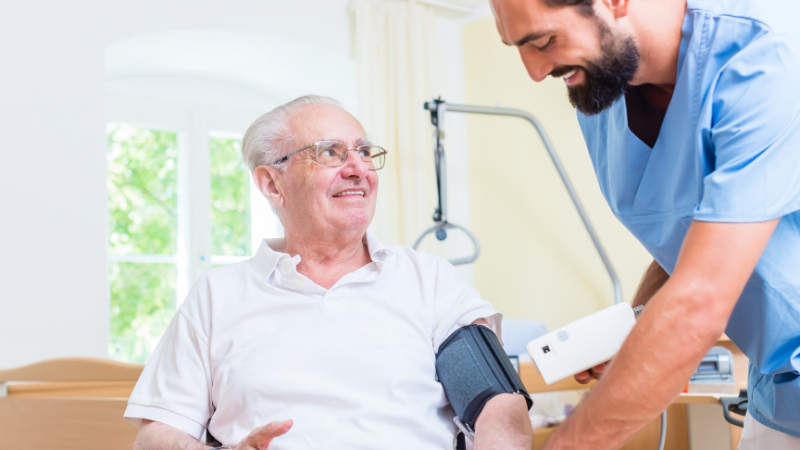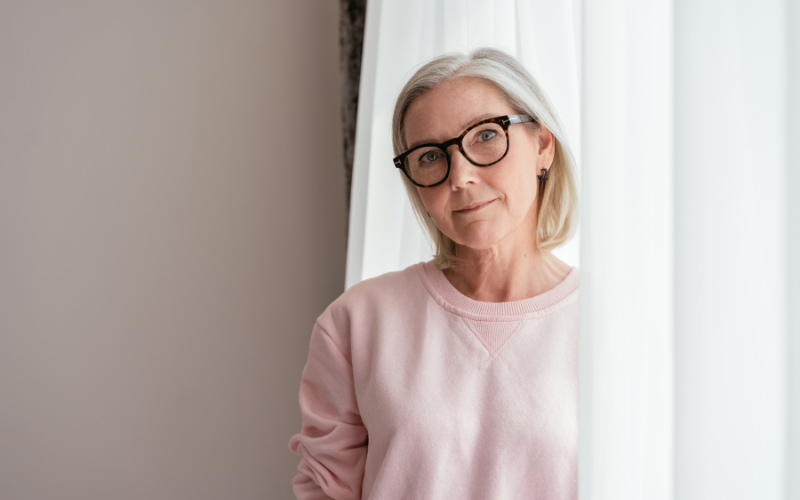As we age, our bodies go through natural changes, and with those changes come different health risks—a decrease in blood pressure is one of them. For many seniors, low blood pressure can become increasingly common as they move into their elderly years. Low blood pressure (also known as hypotension) in the elderly can be concerning, but understanding the causes and treatments for this condition is key to keeping your loved ones healthy. In this blog, we’ll discuss what low blood pressure means for seniors and how to manage it. We’ll review some of the most common causes for low blood pressure in older adults, how to treat it, and some additional implications of low blood pressure you might not have known about.

What Does Low Blood Pressure Mean for Seniors?
Low blood pressure, also known as hypotension, can be concerning for seniors. While it is generally considered healthy to have a lower blood pressure, having it too low can lead to a number of problems such as dizziness, fainting, and even falls. Seniors are especially at risk due to changes in the body that can occur with age, such as a decrease in muscle mass and a slower response to changes in blood pressure. Low blood pressure can also be a sign of an underlying condition, so it is important to speak with a healthcare professional if it is consistently low. Managing low blood pressure in seniors may involve lifestyle changes, such as drinking more fluids or changing medications. Ultimately, it’s important to monitor your loved one’s blood pressure regularly and seek medical attention if there are any concerns.
Causes of Low Blood Pressure in the Elderly
Hypotension in the elderly can be caused by many different factors. Some common causes include:
- Medications: Certain medications used to treat high blood pressure, heart conditions, or other health issues can lead to hypotension, particularly if the dosage is too high or if multiple medications interact with each other.
- Dehydration: Older adults may be more prone to dehydration due to various reasons such as decreased thirst sensation, certain medications, or underlying health conditions. Over time, lack of adequate hydration can lead to low blood pressure.
- Orthostatic hypotension: This condition occurs when a person experiences a sudden drop in blood pressure upon standing up from a sitting or lying position. It can be more common in the elderly and may be caused by factors like medication side effects, prolonged bed rest, or autonomic nervous system dysfunction.
- Heart problems: Certain heart conditions, such as heart failure, weak heart muscle (cardiomyopathy), or heart valve disorders, can result in low blood pressure.
- Endocrine disorders: Certain hormonal disorders, such as hypothyroidism or adrenal insufficiency, can cause low blood pressure in the elderly.
- Nutritional deficiencies: Inadequate intake of essential nutrients, particularly vitamin B12 and folate, can lead to anemia, which can contribute to low blood pressure.
- Age-related changes: As people age, their blood vessels may become less elastic and lose some of their ability to constrict and relax, leading to lower blood pressure.
- Other underlying medical conditions: Various medical conditions like Parkinson’s disease, diabetes, and certain neurological disorders can be associated with low blood pressure in the elderly.
If your elderly parent or loved one is experiencing symptoms of low blood pressure such as dizziness, lightheadedness, or fainting, consult a healthcare professional for proper evaluation and management. The underlying cause of low blood pressure should be identified and followed with appropriate treatment strategies.
Fore further information, read How to Increase Seniors’ Blood Oxygen Levels
How to Treat Hypotension in Seniors

Treating hypotension in older adults requires a careful approach, as some tactics can create too much of the opposite effect and cause unsafe increases in blood pressure. Lifestyle modifications such as adding more salt to the diet, increasing fluid intake, limiting heat exposure, and avoiding prolonged periods of standing can help alleviate hypotension. Compression stockings also can help improve blood flow and prevent blood from pooling in the legs, thereby increasing blood pressure. Depending on the severity of the condition, medications such as fludrocortisone or midodrine may be prescribed by a healthcare professional.
If you don’t personally have the capacity to care for your elderly loved one struggling with hypotension, a senior home care provider can step in and provide personal care.
Can low blood pressure cause a stroke?
Low blood pressure, also known as hypotension, can certainly pose a risk for serious health complications, including fainting and dizziness. However, many individuals might not be aware of the potential connection between low blood pressure and stroke. While high blood pressure remains the leading risk factor for stroke, research has found that drops in blood pressure can trigger a stroke in some cases. When blood pressure drops suddenly, the brain may not receive enough oxygen and vital nutrients, leading to a stroke. It’s important to note that for many individuals, low blood pressure won’t amount to any significant health problems. But for those who have experienced drops in blood pressure or have heart disease or diabetes, it’s essential to speak with your healthcare provider to determine if preventative measures or treatment for low blood pressure may be necessary.
Low blood pressure in seniors can result in a number of complications that can impede their quality of life and increase the chance of a stroke or other serious complications if not managed properly. Signs of hypotension in the elderly should be identified and treated as quickly as possible with lifestyle changes, specialty gear, and medications if needed. Seniors who have low blood pressure should also consider how this affects their risk of stroke so that they can take preventive measures. Quality healthcare and comfort are essential in managing hypotension effectively; therefore it’s important for seniors to have access to reliable support and assistance. With Assisting Hands on your side, you can rest assured that your loved one receives safe and reliable comprehensive in-home care services in Geneva, St. Charles, Barlett, and Batavia, IL at (630) 948-8193 to support them in sustaining a healthy life.















